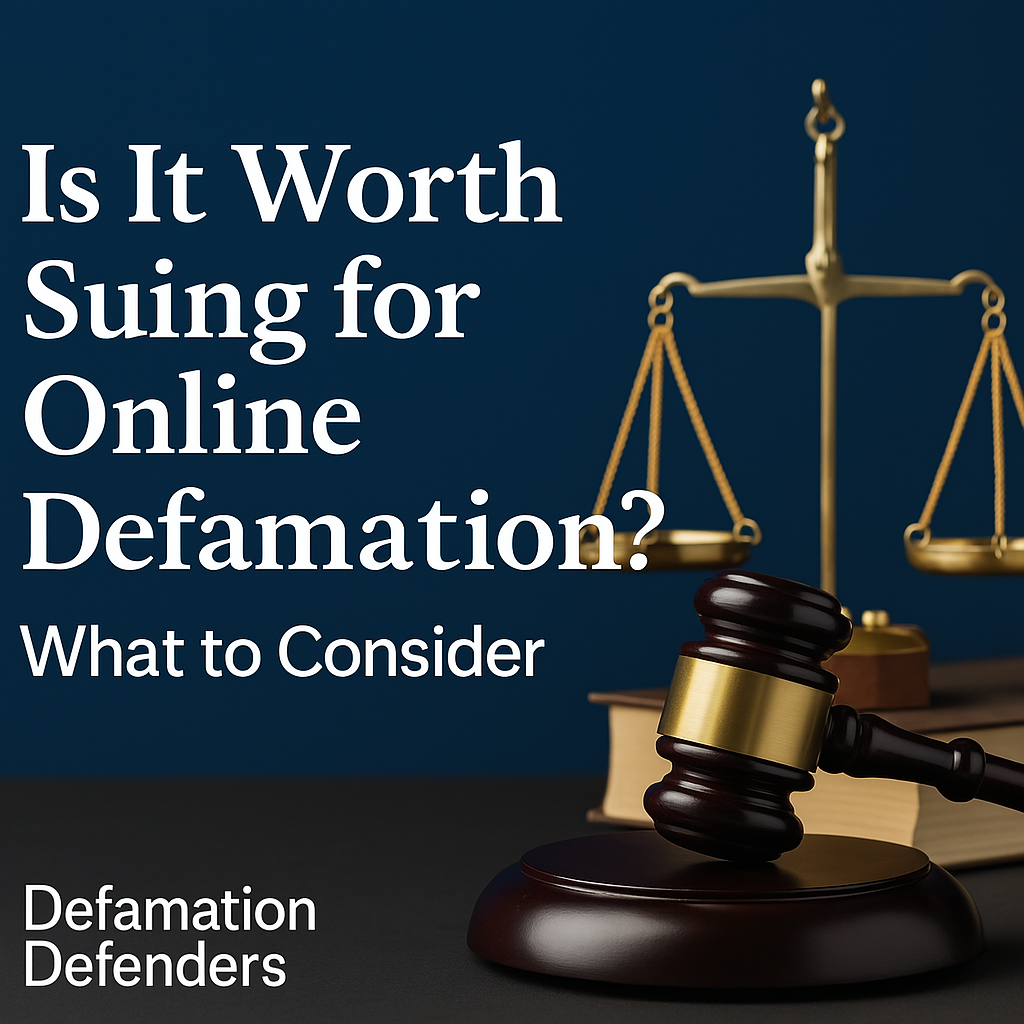Estimated reading time: 5 minutes
Table Of Content
Understanding Online Defamation
Online defamation occurs when someone posts false and harmful statements about another person or business via the internet. This can take many forms:
- Negative reviews based on lies
- Harmful comments on forums or social media
- False allegations in blogs or news sites
The damage can be immediate and lasting, from loss of customers to emotional distress. In serious cases, victims consider taking legal action.
The Core Legal Requirements to Sue
Before deciding whether to sue, ensure your case meets the standard elements of defamation:
- A false statement of fact (not opinion)
- Publication to a third party (someone else saw or heard it)
- Fault amounting to at least negligence
- Harm caused—financial, reputational, or emotional
Without all four, your lawsuit is unlikely to succeed in court.
Pros of Suing for Online Defamation
1. Clear Legal Remedy
A lawsuit provides the opportunity to seek monetary damages and court-ordered removal of the defamatory content.
2. Reputation Restoration
Winning in court helps validate your integrity and can be used to counter the harm.
3. Deterrent Effect
Legal action sends a strong message that defamation will not be tolerated, which may prevent further attacks.
4. Public Record of Vindication
Court rulings are public, which helps reverse reputational damage from false claims.
Cons of Suing for Online Defamation
1. High Legal Costs
Defamation lawsuits can cost $10,000–$100,000+ depending on complexity, legal team, and trial length.
2. Uncertain Outcome
Winning isn’t guaranteed. The burden of proof is on the plaintiff, and defenses like “truth” or “opinion” can nullify your claim.
3. Streisand Effect
Suing might attract more attention to the defamatory content, making things worse before they get better.
4. Time Commitment
A defamation case may take months or years to resolve, draining your time and energy.
5. Jurisdictional Challenges
If the defendant resides in another state or country, filing suit may involve complicated jurisdictional and procedural hurdles.
When Is Suing for Defamation Worth It?
Suing may be worth it if:
- The defamatory statement resulted in significant financial or reputational loss
- The statement is verifiably false
- You’ve exhausted other options like takedown requests or negotiation
- The publisher is identifiable and located in a jurisdiction that supports such legal claims
- Your professional or personal future is directly impacted by the defamation
If the case involves malicious intent, repeated attacks, or high-profile damage, litigation may be a justifiable last resort.
Strategic Alternatives to Suing
In many cases, litigation is not the most practical first step. Consider these cost-effective alternatives:
1. Send a Cease-and-Desist Letter
A formal demand letter can prompt the offender to remove the defamatory content without a lawsuit.
2. Request Removal from the Platform
Most platforms (e.g., Google, Facebook, Yelp) offer ways to report defamatory content for review and possible removal.
3. Hire a Reputation Management Firm
A company like Defamation Defenders can help suppress or remove harmful content through SEO and legal outreach.
📩 Explore our solutions for fast, confidential support.
4. Engage in Online Suppression Strategies
Publishing positive, optimized content can help push defamatory results off the first page of Google.
What Does a Defamation Lawsuit Cost?
Legal Fee Breakdown:
- Initial consultation: $250–$500+
- Filing and court fees: $300–$1,500
- Attorney retainer: $5,000–$15,000+
- Trial preparation and litigation: $10,000–$50,000+
Some attorneys work on contingency for large reputational damage cases, but most defamation cases require upfront fees.
Other Financial Considerations:
- Expert witness fees
- Private investigator fees (to unmask anonymous posters)
- Damage assessment professionals
Factors That Influence Legal Costs
- Jurisdiction (some states have stricter defamation laws)
- Whether the defendant is anonymous (subpoenas add time/cost)
- Number of defendants
- Platform cooperation (e.g., subpoenas to Google or Facebook)
- Need for expert witnesses or damage assessments
- Duration of the defamatory content’s online presence
Suing Anonymous Posters: Is It Possible?
Yes—but it’s complicated. You’ll need to:
- File a John Doe lawsuit
- Subpoena the platform or hosting provider for IP addresses
- Match the identity through legal discovery
Courts often allow this when there’s strong evidence the speech is defamatory and not protected opinion.
🔍 Anonymous posts on Reddit, Glassdoor, or Ripoff Report can often be traced through strategic legal processes.
Case Study: A Business Owner Fights Back
A small business owner in California was targeted by a competitor posting fake 1-star reviews. After cease-and-desist letters failed, the owner hired a reputation management firm to gather evidence and file suit.
Outcome:
- Court ordered removal of reviews
- $25,000 in damages awarded
- Competitor issued public apology
This illustrates that strategic legal action—combined with evidence and online reputation support—can produce real results.
The Role of Defamation Defenders
Defamation Defenders helps victims of online defamation avoid costly court battles with proven solutions like:
- SEO suppression of defamatory content
- Content removal through takedown negotiations
- Legal referrals to top defamation attorneys
- Monitoring tools to detect new attacks
- Review and reputation rebuilding strategies
✅ Request a consultation and reclaim your reputation with the help of experienced professionals.
Frequently Asked Questions
Yes. Defamation law protects private individuals and businesses.
You may still sue, but jurisdictional issues can complicate the process.
Yes, platforms often allow reporting false reviews. Legal letters can also be persuasive.
Yes—most cases range from $10,000 to $100,000 depending on complexity.
Statutes of limitation vary by state, but typically range from one to two years after publication.
Not always automatically, but court orders can be submitted to search engines and platforms for enforcement.
Related Contents:



